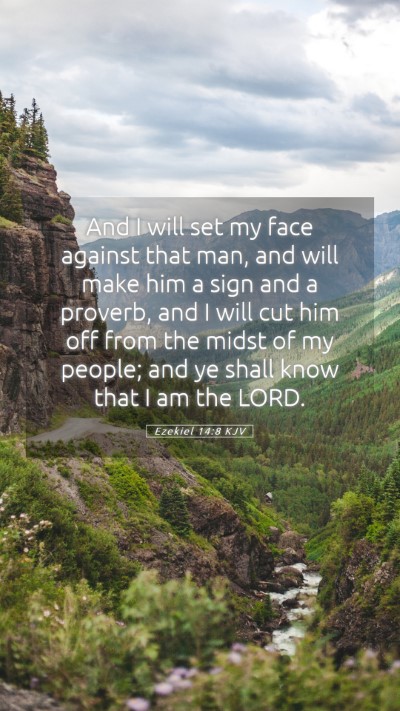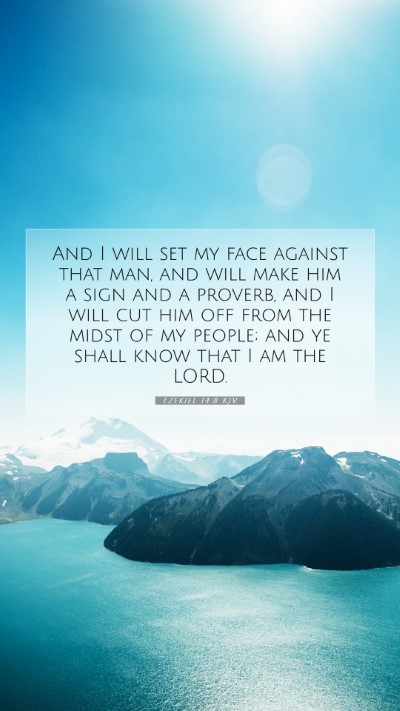Ezekiel 14:8 - Understanding the Verse
Bible Verse: Ezekiel 14:8 - "And I will set my face against that man, and will make him a sign and a proverb, and I will cut him off from the midst of my people; and ye shall know that I am the Lord."
This verse from Ezekiel serves as a profound declaration of God's judgment upon those who lead others astray, particularly in the context of idolatry and false teachings. The prophet Ezekiel, called by God to deliver His messages during a tumultuous time in Israel's history, captures the severity of divine displeasure against the people who refuse to turn from their sins.
Overview of Insights from Commentaries
This analysis combines insights from public domain commentaries including those by Matthew Henry, Albert Barnes, and Adam Clarke, providing a comprehensive perspective on this significant scripture.
Matthew Henry's Commentary
Matthew Henry emphasizes that God's judgment is not arbitrary but is a response to the actions and attitudes of His people. He points out that those who persist in rebellion against God will serve as examples (signs and proverbs) to others. Their fate serves as a warning regarding the consequences of forsaking divine commandments.
Albert Barnes' Notes
Albert Barnes underscores the idea that God's face being set against an individual signifies a total rejection and condemnation. Barnes explains that this rejection leads to a public disgrace, serving as a potent reminder to the community regarding the importance of obedience to God. It reflects a broader theme found throughout Scripture about the seriousness of turning away from faithfulness to God.
Adam Clarke's Commentary
In his analysis, Adam Clarke sheds light on the metaphorical significance of being made a "sign and a proverb." He clarifies that such individuals are highlighted not only for their punishment but also for what they illustrate about the nature of divine justice. Clarke marks this as a pivotal teaching moment, revealing how God's righteousness interfaces with human behavior.
Key Themes and Applications
- The Severity of Divine Judgment: The significance of God's response to idolatry signifies a greater call to understand the nature of sin and its repercussions.
- The Role of Examples: The verse shows that God sometimes uses the consequences faced by individuals to serve as warning signs to others in the community.
- Community Awareness: The ramifications of an individual's disobedience impact the larger group, emphasizing the interconnectedness of the faith community.
Cross References
- Leviticus 20:3-6 - Discusses the consequences of idolatry and seeking after false gods.
- Jeremiah 14:10 - Illustrates God's disapproval of His people who have turned away from Him.
- Romans 11:22 - Warns about the kindness and severity of God, encouraging believers to remain steadfast in their faith.
Conclusion
Ezekiel 14:8 serves not only as a historical admonition but also a contemporary reminder for believers today as they engage in Bible study insights. Understanding scripture through the lens of such commentary allows for deeper Bible verse explanations and facilitates online Bible study groups in grappling with difficult Bible passages. Those who seek to interpret the Bible effectively must appreciate the significance of individual obedience within a communal context, as demonstrated in this verse.
This verse invites reflection on personal conduct, community responsibility, and the ultimate grace available through repentance and faith. Overall, each analysis from these reputable commentaries contributes to an enriched Bible verse interpretation that remains relevant across generations.


